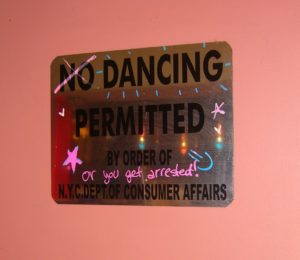Why Can’t New Yorkers Dance in Bars? (an overview of occupational and business licensing laws)

This is the first post in a series on occupational and business licensing.
After almost a century in effect, and multiple failed attempts at repeal in the 2000s, New York’s no-dancing law has finally been struck down.
Passed in 1926 during the Prohibition, opponents of the Cabaret Law hailed it as antiquated and unnecessary, and disadvantageous to unlicensed businesses — of which there are many. On the other hand, supporters cited safety and noise concerns.
While opponents of the law were ultimately successful — the Council voted 41 to 1 to repeal the law, which now goes to Mayor Bill de Blasio who is supportive of the repeal — this fight over an outdated law is a useful prism through which to view general business regulation.

“NO DANCING PERMITTED” by Scott Kidder is licensed under CC BY-NC-ND 2.0 https://www.flickr.com/photos/ skidder/30770623/
After all, similar regulations, and corresponding debates about their effectiveness, remain prevalent across many other industries (though they likely lack the wonderful signage of the Cabaret Law).
Liquor, automobiles, caskets, taxis, and orthodontics are but a few of the industries similarly restricted by occupational or business licensing laws.
Licensing laws create barriers to taking up a profession by requiring those who wish to enter a given market meet certain qualifications. These qualifications can take the form of education, experience, or examination, and in return for their completion a license is awarded. Business licensing, on the other hand, requires an enterprise to obtain a license to operate in a given jurisdiction, licenses which are sometimes subject to a fixed, upper limit.
Although the stated overarching objective of licensing regulations is the same — protect and benefit consumers — how licensing accomplishes this varies considerably.
For example, consumers could benefit from licensing laws because they: uphold good societal morals or, conversely, limit immoral behavior; prevent the sale of low quality products and services that otherwise could endanger or disadvantage consumers; and guarantee a rate of return (RoR) necessary to preserve a market depended upon by consumers.
Thus, (at least for the purposes of this series) licensing laws can be grouped into three categories: morality, quality, and RoR. It’s worth noting, however, that there can be overlap between these categories; for example, doctors require medical licenses arguably to both assure high quality medical care and to fulfill a moral obligation to protect the public from harm.
To ensure this quality, uphold certain moral virtues, or protect consumers by guaranteeing a RoR, the quantity of licenses is restricted by: making them difficult to obtain, capping them at a certain amount, or imposing licenses such that it creates middlemen in the market.
For instance, the number of medical licenses are generally not capped at a certain amount but, rather, by making it extremely difficult, time consuming, and expensive to acquire one. As DisCo has previously noted, similar structures regulate the the practice of law. Meanwhile liquor licenses, as you’ll soon see, are capped at a specific quantity in certain cities.
Conversely, in the automobile industry manufacturers are required to use a dealership (i.e. a middleman) to sell their cars because they are unable to obtain the license necessary for selling automobiles.
Naturally, licensing laws have been a point of contention in many industries, with campaigns for their dissolution often spearheaded by those who are restricted by them: hopeful new entrants who regard them as anti-competitive and unfair to consumers and small businesses.
Meanwhile, current licensees generally argue the laws are necessary to safeguard consumers’ health and keep their business afloat.
By examining the history of licensing laws and the similar debates they inspire in different industries, both in the past and present, this series will illuminate how usually well-intentioned regulations — like the prohibition of dancing — can restrict individuals and businesses from engaging in commerce in pursuit of the perceived public interest.








